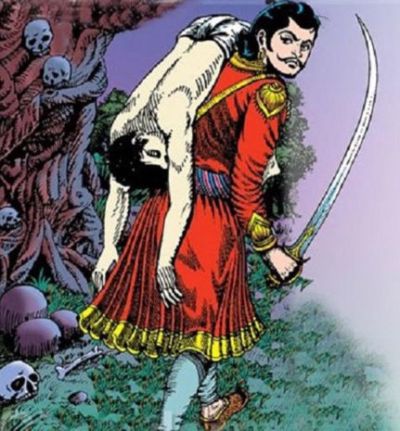Read the previous part here...
Now I have a question for you. Who among the three – Indulekhā, Tārāvalī or Mṛgāṅkavatī, was the most delicate? Remember, if you know the answer, and don’t tell me the truth, your head will burst into a hundred pieces!

तच् छ्रुत्वा सो ऽब्रवीद् राजा सुकुमारतरात्र सा ।
अस्पृष्टे मुसले यस्याः शब्देनैवोद्गताः किणाः ॥ १२,१८.३७ ॥
उत्पलेन्दुकरैः स्पर्शे वृत्ते त्व् इतरयोर् द्वयोः ।
संजाता व्रणविस्फोटास् तेन तस्या न ते समे ॥ १२,१८.३८ ॥
इति तस्योक्तवतो ऽंसाद् राज्ञो भूयो जगाम स स्वपदम् ।
वेतालः स च राजा तथैव तं सुदृढनिश्चयो ऽनुययौ ॥ १२,१८.३९ ॥
King Vikram replied…
“The most delicate among them was Queen Mṛgāṅkavatī. She got bruises on her hand by just hearing the sound of the pestle, without even touching it. The lotus had touched the first queen, and the moonlight had fallen on the skin of the second. The other two queens were delicate as well, but not as much as Mṛgāṅkavatī.”
As the king uttered these words, the Vetāla flew off his shoulder, laughing. And King Vikram once more started to walk towards the banyan tree, determined to fetch him.
द्वादशो वतेालः
The Twelfth Story
The saga of Dīrghadarśin…
स त्रिविक्रमसेनो ऽथ पुनस् तं शिंशपातरुम् ।
गत्वा प्राप्य च वेतालं राजा स्कन्धे चकार तम् ॥ १२,१९.१ ॥
प्रतस्थे च तम् आदाय तूष्णीम् एव स पूर्ववत् ।
ततो भूयस् तम् आह स्म वेतालः सो ऽंसपृष्ठतः ॥ १२,१९.२ ॥
राजन्न् एवम् अनुद्विग्नः पर्याप्तम् असि मे प्रियः ।
तद् एतां शृण्व् अखेदाय हृद्याम् आख्यामि ते कथाम् ॥ १२,१९.३ ॥
King Vikram brought down the Vetāla once again, put him across his shoulder, and started to walk back towards his destination.
The Vetāla spoke to him and said “You never give up, o king, and that is what I like about you. So here is a story that can help entertain you.”
अङ्गदेशे यशःकेतुर् इति राजाभवत् पुरा ।
क्ष्माम् आश्रितो ऽङ्गगुप्त्यर्थम् अदग्धो ऽन्य इव स्मरः ॥ १२,१९.४ ॥
बाहुवीर्यजिताशेषवैरिवर्गस्य तस्य च ।
दीर्घदर्शीत्य् अभून् मन्त्री शक्रस्येव बृहस्पतिः ॥ १२,१९.५ ॥
तस्मिन् मन्त्रिणि विन्यस्य राज्यं स हतकण्टकम् ।
शनैः सुखैकसक्तो ऽभूद् वयोरूपमदान् नृपः ॥ १२,१९.६ ॥
तस्थाव् अन्तःपुरे शश्वन् नास्थाने प्रमदास्पदे ।
शुश्राव रक्तिमद् गीतं वचनं न हितैषिणाम् ॥ १२,१९.७ ॥
रज्यति स्म च निश्चिन्तो जालवातायनेषु सः ।
न पुना राजकार्येषु बहुच्छिद्रेषु जात्व् अपि ॥ १२,१९.८ ॥
दीर्घदर्शी तु तद् राज्यचिन्ताभारं समुद्वहन् ।
अतिष्ठत् स महामन्त्री दिवानिशम् अतन्द्रितः ॥ १२,१९.९ ॥
नाममात्रे कृतधृतिं प्रक्षिप्य व्यसने नृपम् ।
मन्त्री राज्ञः श्रियं भुङ्क्ते दीर्घदर्शीह साम्प्रतम् ॥ १२,१९.१० ॥
In the faraway land of Aṅga, lived a young king named Yaśaḥketu (the one with the flag of fame). He was very handsome, and it seemed like the Deva of love Manmatha had himself come to the earth to rule in his form. He had conquered all his enemies by fighting with bravery and valor, and ruled over much of the east of Bhāratvarshā.
Like Indra had Bṛhaspati as a minister, Yaśaḥketu had Dīrghadarśin (the one who is far-sighted). Dīrghadarśin was an able and knowledgeable minister, and managed the affairs of the kingdom well.
In the course of time, the king, infatuated with his handsomeness and popularity with the ladies of the harem, spent most of his time in pleasure, and left the reins of the kingdom in the able hands of his minister.
The king started to spend his days listening to beautiful songs in the company of lovely women, instead of listening to the voices of his well-wishers. His nights were spent watching the moonlight filter through the latticed holes of his chambers, and not thinking about the affairs of his kingdom.
Dīrghadarśin however, continued to work responsibly, shouldering the king’s duties as well as his own. He worked relentlessly day and night, upto a point when rumors started floating around the kingdom that the minister was the one who had set the king on wayward ways, so that he could usurp all the power for himself.
Disturbed at this rumor, Dīrghadarśin called his wife Medhāvatī aside one night, and said…
to be continued…
